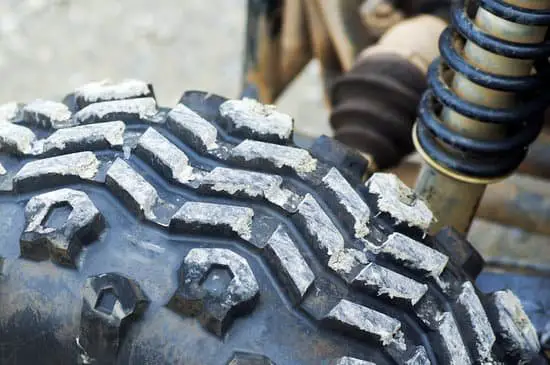Before answering the question are off-road tires good for snow, let’s briefly introduce off-road tires.
If you have been treading on your vehicle for long and difficult surfaces, you must know what off-road tires are. For those of you who are unfamiliar with the term, these tires are specifically designed to give a great grip on unpaved surfaces.
You know, some vehicles don’t only run on highways. There are challenging roads with mud and gravel to control your vehicle on.
For such thrills, off-road tires are the best match. Your SUV may not perfect the journey with those two pairs of on-road tires when going to mountainous or desert areas.
Two measure components of an off-road tire set it apart from an on-road tire.
The first one is the deep tread that in the case of larger tires, is deeper. The second one is the exposed edges of the tread that protect the tire against frequent punctures.
Types of Off-road Tires
Off-road tires are broadly divided into three categories which are:
Highway Terrain Tires
These tires are similar to the on-road tires with shallow tread. The tread edges are not very obvious; thus, there is no heavy grip on the off-road tracks, but they are fairly good for both paved and unpaved surfaces.
As an off-roading option, they are not the ideal type of tires. However, they have a long life as compared to usual off-road tires.
All Terrain Tires
All-terrain tires support every type of journey. From paved smooth roads to bumpy, gravel-filled landscapes, these tires work efficiently. Cost is the only disadvantage these tires have over the highway terrain tires.
Mud Terrain Tires
They are the most sturdy of all three types. With deep tread, they offer friction on surfaces that are muddy or rocky. However, they can quickly wear out on paved surfaces.
All these tires are expensive as compared to the on-road tires with shorter lives. They are good for vehicles that run in special conditions such as driving in hilly or desert areas or for people who love expeditions to the tough landscapes.
Now that we have covered the off-road tires basics let’s move on to picking a tire for the winter season?
How to Pick a Tire for Your Vehicle in Snow?
Picking a tire may seem an easy choice, but trust me, it can be a challenge for harsh weather conditions. There are eight factors to take into account when picking up a tire to meet harsh weather conditions:
The Size of Tire
When you are about to decide on replacing your tires for snow, the first question is the tire’s size. The tire size is mentioned on the sidewall of a tire in the form of a code.
The code represents the width of the tread, the height and width ratio of the tire, and the tire’s interior diameter.
When replacing the tire, it is important to pick the correct size as your summer tires. If you go up or down, your vehicle performance will dropdown.
The Types of Roads That Your Vehicle Will Run on
Do you drive your vehicle only inside the city?
Is the highway your major route to commute?
Before deciding to replace tires for winters, make a mental note of what kind of roads you run your vehicle on.
Your exposure of snow, if less, may not require you to invest a huge sum of money in new tires.
Observe the Tires in the Store
You may find it absurd to go to a tire shop and observe tires, but it helps. You can compare different products based on the groove size, sipe, width, and flexibility.
Keep in mind that sipe gives better traction on snow and slushy areas as compared to deep treads.
Flexible tires better adapt to snowy surfaces due to the surface area they get in contact with. The tires that do not have flexible material can get stiff in snowmaking the vehicle difficult to drive.
Ask Relevant Questions
The decision of picking up the best suitable tires for your winter tread is a tough one. It needs a thorough investigation into the type of roads you drive your vehicle to your vehicle’s budget and fuel requirements.
Asking relevant questions to the sales rep will help you pick the best tires.
Check the Braking Ability
Putting so much effort in just changing the tires for winters may seem an alien idea to many. However, poor quality tires can lead to harsh accidents in extreme weather conditions.
After all, your life is more important than the investment you will make in the tires. While picking tires for winters, it is essential to keep the braking ability in mind.
Not all tires give a tight grip on snow with the brakes. There is always a fair chance of skidding with smaller vehicles. So do your research before selecting a tire.
Do Not Become the Victim of Offers
While many offers may tempt you to select a tire, keep the above-listed points in mind before making the decision of purchasing tires. No matter how hard the sales reps try, hold your ground and check everything before making the decision.
Pick a Single Brand and Type for Both the Pairs
You may get tempted to buy different types of tires, but it is not a good idea. If you’re picking up two tire brands, their wear and tear rate will be different that can ultimately cause damage to your vehicle’s performance.
Keep an Eye on the Money Involved
The tires are a big investment, especially when it comes to tires for winters. Make sure to stick to your budget by comparing prices and visiting different stores to better idea a product that comes under your budget.
Should You Pick Off-road Tires for Winter?
Coming back to the question ‘Are off-road tires good for snow?’ now you have all the parameters listed for selecting the ideal tires for winters.
Let’s dig deep into the off-road tires category.
Off-road tires have deep tread, as mentioned earlier. The biggest problem with these tires is that they pack up snow in the gaps while they scoop out sand and mud.
When the snowpacks between the gaps, the tires offer low friction against the road surface, making the vehicle slip on hard snowy surfaces.
The braking ability is deficient in the snow with off-road tires, so it is not fair to go with them.
However, if you’re big on off-road tires, the only option you have is to run a heavy vehicle with a tire size that doesn’t even get affected by the snow.





